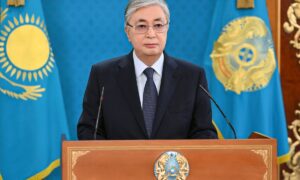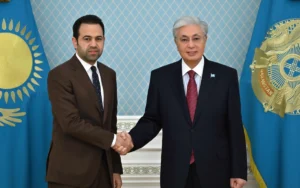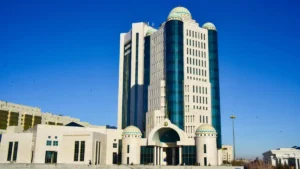Kazakh FM Addresses 79th UN General Assembly

New York, The Gulf Observer: Murat Nurtleu, Deputy Prime Minister and Minister of Foreign Affairs of Kazakhstan, delivered a compelling address during the general debate of the 79th session of the United Nations General Assembly, highlighting the urgency of global cooperation in addressing critical security, climate, and technological challenges.
Speaking at a pivotal moment for international security, Nurtleu remarked, “The global security system is on the brink of collapse. Dozens of countries are gripped by conflict and instability, claiming many thousands of lives, while entire continents are affected by the climate crisis.” He urged collective action, recalling President Kassym-Jomart Tokayev’s initiative of “World Unity for a Just Peace and Harmony,” which was introduced during last year’s session.
The Kazakh Foreign Minister emphasized the importance of involving middle powers in global governance. “The voices of middle powers and developing nations are vital in bridging divides and nurturing a more effective international security architecture,” Nurtleu stressed, underscoring Kazakhstan’s belief in multilateralism and collaboration in addressing the world’s most pressing issues.
Focus on Nuclear Security and Climate Action
Nurtleu devoted part of his speech to nuclear security, calling for stringent adherence to international agreements such as the Treaty on the Non-Proliferation of Nuclear Weapons (NPT) and the Comprehensive Nuclear-Test-Ban Treaty (CTBT). “The escalating rhetoric of nuclear threats requires strict compliance by all nuclear powers,” he warned, reiterating Kazakhstan’s longstanding commitment to nuclear disarmament.
On the issue of climate change, Nurtleu urged developed nations and international financial institutions to assist low- and middle-income countries with green technologies and concessional financing. Referring to Kazakhstan’s proactive role, he announced the country’s intention to host a Regional Climate Summit in 2026, reinforcing its dedication to environmental leadership.
Human Rights Reforms and Regional Initiatives
Nurtleu also highlighted Kazakhstan’s internal reforms, aimed at building a “Just Kazakhstan.” He noted the abolition of the death penalty, enhanced protections against violence targeting children and women, a strengthened zero-tolerance policy on torture, and bolstered national preventive mechanisms.
He further informed the Assembly of Kazakhstan’s initiative, in collaboration with other Central Asian nations and Mongolia, to become the first region free of the death penalty. This underscores the country’s commitment to advancing human rights in the region.
Calls for Sustainable Development and Regional Cooperation
As the world approaches the 2030 deadline for the UN’s Sustainable Development Goals (SDGs), Nurtleu called for stronger coordination of UN agencies in Central Asia. He urged member states to support Kazakhstan’s proposal to establish a UN Regional Centre on Sustainable Development for Central Asia and Afghanistan in Almaty, reflecting Kazakhstan’s role as a leader in regional development efforts.
In his remarks, Nurtleu also highlighted Kazakhstan’s status as the world’s largest landlocked country, advocating for the interests of similar nations. “Despite significant strides, we are still far from fully implementing the Vienna Programme of Action,” he said, referring to challenges such as limited trade and transportation corridors, debt burdens, and underinvestment. Kazakhstan, however, continues to expand its role as a transit hub between Asia and Europe, with plans to further align with the Belt and Road Initiative, as well as the North-South and Trans-Caspian International Transport Route corridors.
Emphasis on Digital Transformation and AI
Nurtleu stressed the critical role of technology in global development, particularly the need for equitable access. “The Digital Agenda 2030 requires equal access to technology,” he said, noting the challenges posed by artificial intelligence (AI), including cyber threats and data security. He suggested strengthening the UN’s role in setting ethical standards for AI, and applauded the proposal to establish a UN AI Office.
Looking Forward to a Brighter Future
In closing, the Kazakh Foreign Minister expressed hope that both the Future Summit and the ongoing session of the UN General Assembly would pave the way for meaningful transformation. “Let these events pave the way for transformation for our common future,” he concluded, emphasizing Kazakhstan’s commitment to contributing to a more secure, inclusive, and sustainable global community.
Kazakhstan continues to play a key role on the global stage, advocating for peace, human rights, sustainable development, and the responsible use of technology.


